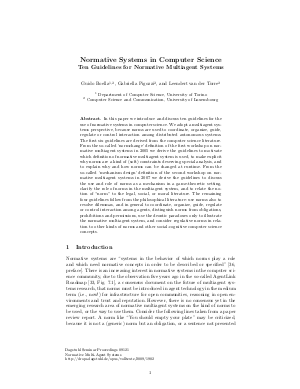Normative Systems in Computer Science - Ten Guidelines for Normative Multiagent Systems
Authors Guido Boella, Gabriella Pigozzi, Leendert van der Torre
-
Part of:
Volume:
Dagstuhl Seminar Proceedings, Volume 9121
Part of: Series: Dagstuhl Seminar Proceedings (DagSemProc) - License:
 Creative Commons Attribution 4.0 International license
Creative Commons Attribution 4.0 International license
- Publication Date: 2009-03-11
File

PDF
DagSemProc.09121.2.pdf
- Filesize: 230 kB
- 21 pages
Document Identifiers
Subject Classification
Keywords
- Normative systems - Guidelines - Norms - Multiagent systems - Deontic logic
Metrics
- Access Statistics
-
Total Accesses (updated on a weekly basis)
0Document
0Metadata
Abstract
In this paper we introduce and discuss ten guidelines for the use of normative systems in computer science. We adopt a multiagent sys- tems perspective, because norms are used to coordinate, organize, guide, regulate or control interaction among distributed autonomous systems. The first six guidelines are derived from the computer science literature. From the so-called ‘normchange’ definition of the first workshop on nor- mative multiagent systems in 2005 we derive the guidelines to motivate which definition of normative multiagent system is used, to make explicit why norms are a kind of (soft) constraints deserving special analysis, and to explain why and how norms can be changed at runtime. From the so-called ‘mechanism design’ definition of the second workshop on nor- mative multiagent systems in 2007 we derive the guidelines to discuss the use and role of norms as a mechanism in a game-theoretic setting, clarify the role of norms in the multiagent system, and to relate the no- tion of “norm” to the legal, social, or moral literature. The remaining four guidelines follow from the philosophical literature: use norms also to resolve dilemmas, and in general to coordinate, organize, guide, regulate or control interaction among agents, distinguish norms from obligations, prohibitions and permissions, use the deontic paradoxes only to illustrate the normative multiagent system, and consider regulative norms in rela- tion to other kinds of norms and other social-cognitive computer science concepts.
Cite As Get BibTex
Guido Boella, Gabriella Pigozzi, and Leendert van der Torre. Normative Systems in Computer Science - Ten Guidelines for Normative Multiagent Systems. In Normative Multi-Agent Systems. Dagstuhl Seminar Proceedings, Volume 9121, pp. 1-21, Schloss Dagstuhl – Leibniz-Zentrum für Informatik (2009)
https://doi.org/10.4230/DagSemProc.09121.2
BibTex
@InProceedings{boella_et_al:DagSemProc.09121.2,
author = {Boella, Guido and Pigozzi, Gabriella and van der Torre, Leendert},
title = {{Normative Systems in Computer Science - Ten Guidelines for Normative Multiagent Systems}},
booktitle = {Normative Multi-Agent Systems},
pages = {1--21},
series = {Dagstuhl Seminar Proceedings (DagSemProc)},
ISSN = {1862-4405},
year = {2009},
volume = {9121},
editor = {Guido Boella and Pablo Noriega and Gabriella Pigozzi and Harko Verhagen},
publisher = {Schloss Dagstuhl -- Leibniz-Zentrum f{\"u}r Informatik},
address = {Dagstuhl, Germany},
URL = {https://drops.dagstuhl.de/entities/document/10.4230/DagSemProc.09121.2},
URN = {urn:nbn:de:0030-drops-19029},
doi = {10.4230/DagSemProc.09121.2},
annote = {Keywords: Normative systems - Guidelines - Norms - Multiagent systems - Deontic logic}
}
